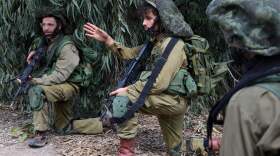
Larry Kaplow
Larry Kaplow edits the work of NPR's correspondents in the Middle East and helps direct coverage about the region. That has included NPR's work on the Syrian civil war, the Trump administration's reduction in refugee admissions, the Iran nuclear deal, the US-backed fight against ISIS in Syria and Iraq, and the conflict between the Israelis and Palestinians.
He has been at NPR since 2013, starting as an overnight news editor. He moved to the International Desk in 2014. He won NPR's Newcomer Award and was part of teams that won an Overseas Press Club Award and an NPR Content Excellence Award.
Prior to joining NPR, Kaplow reported from the Middle East for 12 years. He was the Cox Newspapers' Mideast correspondent from 1997 to 2003, reporting from Jerusalem during the Second Intifada as well as from Egypt, Jordan, Iran, Iraq, and Lebanon. He did reporting stints on the NATO campaign in Kosovo and the toppling of Taliban regime in Afghanistan.
He moved to Baghdad just before the US invasion of Iraq in 2003. He covered the invasion, the fall of the regime and continued reporting from Iraq for Cox Newspapers and eventually Newsweek until late 2009. In 2010, he returned to Iraq to help report an episode of This American Life.
He was part of a team that won the top prize from the Military Reporters and Editors Association for stories about failures in the US system for compensating Iraqi war victims.
He was a freelance reporter in Mexico City from 2011 to 2013. He also reported from Guatemala on the efforts to prosecute soldiers responsible for a massacre in the 1980s.
Before reporting abroad, Kaplow worked at The Palm Beach Post and The Bradenton Herald in Florida, covering courts, schools, and state government. He graduated from Duke University and was in the Peace Corps in Guatemala.
-
Trump has prompted a redistricting race as he tries to maintain Republican control of the House in the 2026 elections. Democrats have fewer options to counter, as the battle heads into next year.
-
In the summer, Texas drew new lines to help the GOP win in the midterm elections. California countered this week. The Republicans might have an edge in the redistricting battle as it spreads nationally.
-
First Trump got Texas to redistrict to help Republicans win five House seats there. California Democrats are trying to counter that. Now Missouri lawmakers move to help the GOP win another seat.
-
After a federal court in California ruled that President Trump's use of the National Guard in Los Angeles was illegal, Trump touted his use of the Guard in Washington, D.C., and said Chicago is next.
-
In a battle prompted by President Trump, Texas and California could redraw lines that change whose votes really matter in the 2026 congressional elections.
-
The ruling maintains a block on a lower court's order that found President Trump was using the Guard in LA illegally in his immigration crackdown.
-
A look at Florida and Illinois shows how legislatures in the country's often polarized state politics are responding to the Trump administration. States hold a lot of power over what gets done.
-
Federal power only goes so far. State governors and legislatures have wide authority over local law enforcement, schools, health and how cities and counties handle immigration.
-
Voters in 10 states are deciding whether to put protections for reproductive rights into their state constitutions.
-
The court ruled that a state law with the ban can take effect, replacing the 20-weeks allowed currently
-
Concern about a spread of the Israel-Hamas war ripples across the Middle East - as does growing anger at the U.S. for supporting Israel.
-
The Israeli military said it has largely regained control of areas in the south that had been attacked by militants from Hamas. The announcement came on the fourth day of war with Hamas.











